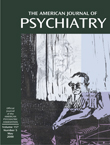Comparison of Sertraline and Nortriptyline in the Treatment of Major Depressive Disorder in Late Life
Abstract
OBJECTIVE: This study was designed to evaluate the comparative efficacy and safety of sertraline and nortriptyline for the treatment of major depressive disorder in older adults. METHOD: A double-blind, parallel group design was used to compare 210 outpatients, 60 years of age and older, who met DSM-III-R criteria for major depressive episode and had a minimum Hamilton Depression Rating Scale score of 18. The patients were randomly assigned to 12 weeks of treatment with either sertraline (50–150 mg/day) or nortriptyline (25–100 mg/day). RESULTS: The safety profiles of the two treatments were similar except that nortriptyline treatment was associated with a significant increase in pulse rate, whereas sertraline was associated with a nonsignificant decrease. Efficacy of both drugs was similar for both treatments at all time points, with 71.6% (N=53 of 74) of the sertraline-treated patients and 61.4% (N=43 of 70) of the nortriptyline-treated patients achieving responder status by week 12. Time to response was also similar, with more than 75% of the improvement in scores on the Hamilton depression scale having occurred by week 6. Secondary efficacy measures (posttreatment measures of cognitive function, memory, and quality of life) revealed a significant advantage for sertraline treatment. CONCLUSIONS: Primary efficacy measures showed sertraline and nortriptyline to be similarly effective. With secondary outcome measures there was consistent evidence of an advantage for the sertraline-treated group. The clinical impact of these measures on the long-term well-being of elderly depressed patients should be examined in a study of maintenance treatment.



